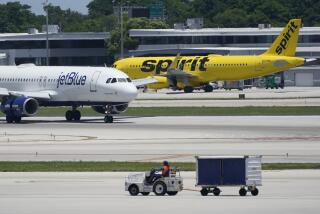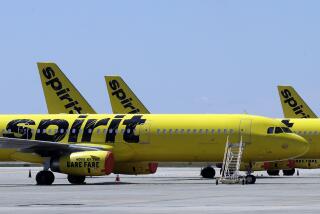Airlines’ attorneys eager to fight U.S. over merger
A day after the U.S. Department of Justice sued to block the mega-merger of American Airlines and US Airways, attorneys for the carriers called the legal challenge weak and said they are looking forward to battling the government in court.
The Justice Department’s lawsuit threw a roadblock in front of a merger that was expected to be completed in the next few weeks. The suit charges that the creation of the world’s largest airline will hurt competition and lead to higher fares.
“They got this one wrong,” said Rich Parker, a lawyer for the airlines and partner at O’Melveny & Myers. “They got this one very wrong.”
The lawsuit comes at a bad time for American Airlines, whose parent company, AMR Corp., was hoping to emerge from bankruptcy under a plan that would unite it with US Airways to better compete with its larger rivals such as Delta and United airlines.
The airlines must now wait to see if the judge overseeing the AMR bankruptcy in New York approves the airline’s restructuring plan Thursday, as scheduled, or puts it on hold until the legal battle with the Justice Department is resolved.
Neither side would predict what the bankruptcy judge will do.
Still, the lawsuit will probably delay the airlines from moving ahead with the merger until at least the end of the year, the airline lawyers said.
The Justice Department’s lawsuit has already been assigned to U.S. District Judge Colleen Kollar-Kotelly, who presided over the government’s antitrust case against Microsoft in 2001.
The Microsoft case was ultimately settled, but when the airlines’ attorneys spoke to reporters and analysts Wednesday, they made it clear that they were eager to fight the case in court.
Asked if the airlines are now pursuing settlement talks with the Justice Department, Paul Denis, a partner at the Philadelphia-based Dechert law firm replied: “We are litigating this case, period.”
Parker was quick to add: “If the government has a creative alternative, we will listen.”
In the 2010 merger of United and Continental, United sold government-issued landing slots at New Jersey’s Newark Liberty International Airport to satisfy concerns raised by the Justice Department.
Landing slots are also a key issue in the Justice Department’s lawsuit against American and US Airways because the consolidated airline would control 69% of the slots at Ronald Reagan Washington National Airport.
The lawyers for the airlines declined to discuss what they might put on the table and said they are now focused on fighting the lawsuit.
US Airways shares closed 13% lower Tuesday after the lawsuit was filed at $16.36 while American shares fell 45% to $3.17 in over-the-counter trading. On Wednesday, US Airways shares dropped an additional 1.16% to $16.17 while American dropped 13.56% to $2.74.
The XAL stock index for major airlines dropped 4% Tuesday on huge volume, falling an additional 0.24% Wednesday.
A spokeswoman for the Department of Justice declined to comment Wednesday, pointing instead to the charges raised in the lawsuit.
The suit also said that the deal would put 70% of the U.S. market in the hands of four major airlines, Delta, United, Southwest and the combined carrier of American and US Airways.
The suit also cites a 2012 internal analysis by American Airlines that said US Airways’ discount ticket program, known as Advantage Fares, would be eliminated under a merger between the two carriers.
Some industry experts say a settlement between the airlines and the Justice Department is still possible.
“Look for some concessions to be made by the airlines, some settlement to be agreed to,” said Rick Seaney, chief executive of Farecompare.com, which tracks airfare trends.
But some analysts say the Justice Department’s case it too strong to overcome, essentially killing the merger.
The Justice Department’s lawsuit says collusion on prices and fees between airlines is more likely when the number of competitors is dramatically reduced.
David Balto, an antitrust lawyer and former policy director of the Federal Trade Commission, said it will be hard for the airlines to offer a remedy to overcome the charges of collusion.
“The Justice Department has a home run on that point,” he said.
Betsy Snyder, a Standard & Poors analyst, noted that AMR entered bankruptcy with a plan to focus expanding its services on five major hubs: Dallas-Fort Worth, Miami, Chicago, New York and Los Angeles.
“They probably will have to dust off those plans and see how those plans work,” she said.






